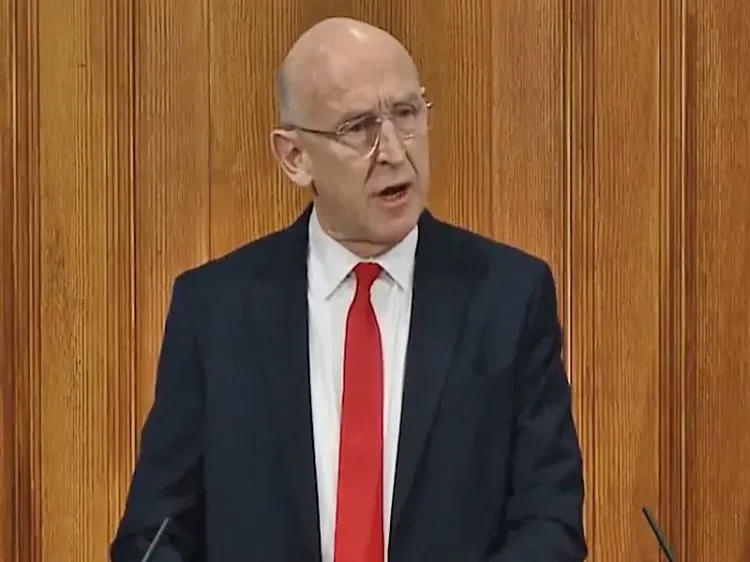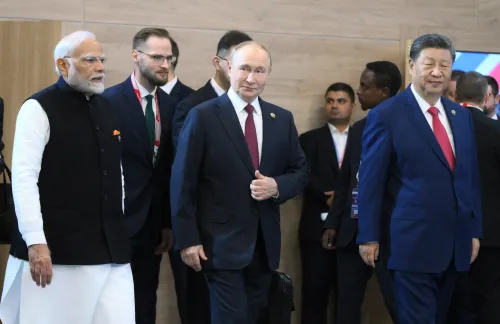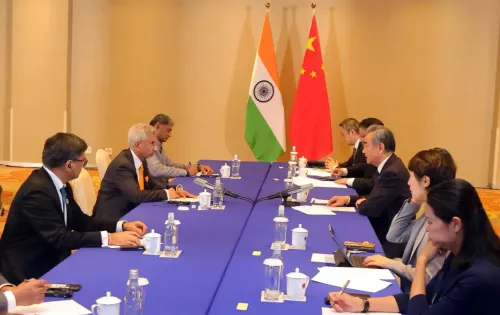Are Armed Forces on Patrol Due to Russian Activity?

Synopsis
Key Takeaways
- UK Armed Forces are stepping up maritime patrols.
- 30% rise in Russian vessels threatening UK waters.
- Defence spending is at its highest since the Cold War.
- Recent encounters include Russian corvettes and espionage vessels.
- New sanctions against Russian cybercrime organizations.
London, Nov 24 (NationPress) The UK Armed Forces have intensified their maritime patrols from the English Channel to the northernmost reaches of the High North due to an uptick in Russian activities, which the UK has deemed as posing a threat to its waters.
In an official statement released on Monday, November 24, the UK’s Defence Ministry detailed that over the last two weeks, the Royal Navy patrol vessel HMS Severn engaged with the Russian corvette RFN Stoikiy and the tanker Yelnya near the UK coastline.
After conducting a continuous surveillance operation, it was noted that these Russian ships navigated through the Dover Strait and proceeded westward across the English Channel. The statement elaborated that HMS Severn subsequently transferred monitoring responsibilities to a NATO ally off the coast of Brittany, while still observing from a distance and remaining prepared to respond to any unforeseen developments.
According to the Defence Ministry, there has been a 30 percent increase in Russian vessels threatening UK waters over the past two years.
On Wednesday, Defence Secretary John Healey confirmed that the Russian spy vessel Yantar, which is reportedly utilized for intelligence gathering and mapping undersea cables, was operating near UK waters north of Scotland.
The crew of the Yantar allegedly directed lasers at RAF P-8 pilots who were monitoring it, described as a reckless and dangerous act. While tracking the Yantar, the Royal Navy frigate HMS Somerset and several civilian vessels in the vicinity encountered GPS jamming, demonstrating further unprofessional conduct intended to disrupt operations.
However, it was noted that the combat capabilities of HMS Somerset remained unaffected.
In response, the UK is enhancing its defense and security measures, buoyed by the most significant sustained rise in defense spending since the Cold War, which includes £4 billion allocated to advancing drone capabilities and over £1 billion to bolster air and missile defense systems to safeguard the UK homeland.
The latest operations come less than a month after HMS Duncan monitored the movements of the Russian destroyer Vice Admiral Kulakov, while the frigate HMS Iron Duke was dispatched to observe the Russian Kilo-class submarine Novorossiysk.
Last month, two advanced RAF surveillance aircraft executed a 12-hour mission along Russia’s border, employing sophisticated sensors to detect Russian activities and provide essential intelligence for further analysis.
This surge in UK Armed Forces activity coincides with new sanctions as Foreign Secretary Yvette Cooper announced last week that the UK, US, and Australia are imposing sanctions on Media Land, a Russian cybercrime organization implicated in facilitating cyber-attacks on UK companies.
Meanwhile, Defense News reported a response from the Russian Embassy in London to Healey’s remarks, accusing the UK government of “inflating militaristic hysteria,” asserting that Moscow has no intentions of compromising the UK’s security.
“My message to Russia and to Putin is this: We see you. We know what you are doing. And we are ready,” the Defence Secretary proclaimed last Wednesday.









